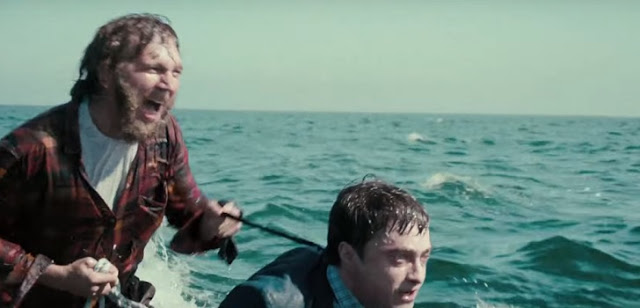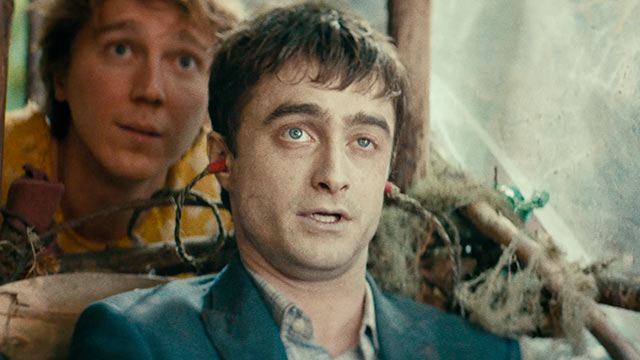“The big bucks are in dick and fart jokes,” Ben Affleck’s character memorably quipped in Chasing Amy. Something tells me that he wasn’t thinking of Swiss Army Man, an aggressively absurd, surprisingly saccharine comedy from the writer-director team of Daniel Kwan and Daniel Scheinert (aka Daniels). This bizarre movie, with its gigantic premise and diminutive budget, does not possess a commercial bone in its proudly misshapen body. But for all its surface weirdness and gross-out humor, Swiss Army Man proves to be a fairly conventional story of isolation and redemption, with broad themes that would fit snugly inside a Disney film. It’s standard self-help shtick, only with more farts and boners.
The source of both is Manny (Daniel Radcliffe, continuing to do his utmost to distance himself from his signature screen persona), a waterlogged corpse whom we first see washing up on a remote beach. His arrival interrupts the attempted suicide of Hank (Paul Dano), a bearded loner who, believing himself to be marooned on this tiny spit of land, has given in to despair. Manny is hardly a good candidate to improve his circumstances, given that he is dead. But in death, he has acquired a peculiar superpower: He can pass gas on command, and his flatulence is so powerful that he can serve as a sort of catatonic motorboat. And so, Hank straddles Manny’s lifeless body, pulls down his pants, and rides him off toward the mainland “like a jet ski”. (If only Manny had appeared off the coast of Mexico instead of California, he would have made poor Blake Lively’s life a whole lot easier.)
If you find that description appalling, grotesque, or just plain stupid, I’ll venture a guess and say that Swiss Army Man isn’t for you. But literalism is the enemy of imagination, and if you can accept the inanity of the film’s foundation, you are likely to be entertained and perhaps even amazed. Hank certainly is—he spends much of the movie’s first act exploring the extent of his deceased companion’s powers, which extend far beyond propulsive flatulence. Manny is largely immobile—to that end, the sheer physicality of Radcliffe’s mummy-like lurching is remarkable—but when prodded by Hank, he can spew water from his mouth, chop wood with his arm, and spit out projectiles at blinding speed. He is, as the title suggests, a multi-purpose survival tool, one whom Hank decides to wield in order to escape the secluded forest where he and Manny find themselves and return to his California home. To that end, one of Manny’s most important abilities derives from his periodic dead-eyed glances at a Sports Illustrated swimsuit issue, at which point he develops prominent erections that—bear with me here—serve as a compass.
Crazy, right? Sure. But once Manny begins to talk—in a sluggish drawl that would have Professor McGonagall wincing—Swiss Army Man starts getting down to its real, syrupy business. Manny, for all his inexplicable corporeal gifts, has no memory of himself or humanity; he is a naïf, a blank slate who lacks any understanding of the modern world. In Kwan and Scheinert’s view, this means that he is woefully unacquainted with two critical building blocks of contemporary civilization: social norms and pop-culture artifacts. Hank decides to use the latter to school Manny in the former, and some of Swiss Army Man‘s funniest scenes involve Hank’s reliance on Hollywood tropes to articulate basic concepts like friendship, shyness, and love. His didactic methods include an impromptu humming of John Williams’ classic theme from Jurassic Park, as well as a repeated reliance on that durable and cheesy cinematic crutch, the montage.
This is good fun, especially for the actors, both of whom commit gleefully to their respective roles. It’s a stretch to say that Dano is playing the straight man of this comedy duo—it’s more that he’s playing the guy who isn’t dead—but he gives Hank a weary everyman sadness, suggesting that he’d be perfectly at home in a more generic romantic comedy, the kind that didn’t require him to carry a corpse around. He also graciously cedes the spotlight to Radcliffe, who revels in Manny’s rigid contortions and slurred speech patterns. He may just be a stumbling, wind-breaking, tent-pitching cadaver, but there’s a touching innocence about him, and Radcliffe makes him genuinely sweet as well as clueless.
The blossoming friendship between Hank and Manny is just one area where Kwan and Scheinert are poking fun at genre, but while they may be gently spoofing the sugary quality of the movies, it’s clear that they’re also buying in. Swiss Army Man fancies itself as an allegory of self-acceptance, and a rebuke to the stifling pressures that society foists upon the individual. We are all, it insists, beautiful snowflakes who must slough off the senseless mandates of politeness and conformity and must instead embrace our quirks and desires. Hank is fond of humming a variation on the classic folk song “Cotton-Eye Joe”, and the film’s thesis could be distilled to the chorus of a different folk anthem: “If you want to sing out, sing out/And if you want to be free, be free.”
As life lessons go, this is not exactly groundbreaking. But even if Swiss Army Man isn’t saying anything especially new, it’s certainly saying it in a new way. Manny proves to be a persistent vessel of inquisitiveness, and his confusion regarding various taboos is reliably amusing. He is fascinated by the prospect of masturbation (“When you do it, do you think about your mom?”), he is curious about the process of sex—among its achievements, this movie surely features the most sincere proposition of “just the tip” in cinematic history—and, most importantly, he is utterly mortified to learn that it is inappropriate to fart in public. To Manny, to suppress such a natural instinct is to deny his very identity. Who wants to be resurrected into a world like that?
That real world—and its attendant repression of true feeling—eventually intrudes upon the cloistered lunacy of Swiss Army Man, and this collision of fantasy and reality does the film no favors. Nor does the too-tidy resolution of the movie’s central mystery. (This is assuredly the first movie ever that is not improved by an appearance from Mary Elizabeth Winstead.) Is Hank’s adventure with Manny a dream? A hallucination? A true miracle? Enjoying Swiss Army Man requires relinquishing these basic questions, so having them answered provides less satisfaction than disappointment. The audacity of the film’s zany sweetness looks a lot less inspired—and a lot more corny—when viewed in the cold light of day.
Still, that audacity is commendable, and it practically functions as a self-fulfilling prophecy. At one point, Hank admonishes Manny, “You can’t just say anything that comes into your head, that’s bad talking!” The very existence of this movie proves him wrong—it’s the kind of picture that would never be made unless artists surrendered to the surreal visions that entered their addled brains. Swiss Army Man isn’t quite the stirring parable that it wants to be, but it certainly scores points for bravado and innovation. As for its flaws, I could be more derisive, but I wouldn’t want to be rude.
Jeremy Beck is the editor-in-chief of MovieManifesto. He watches more movies and television than he probably should.




